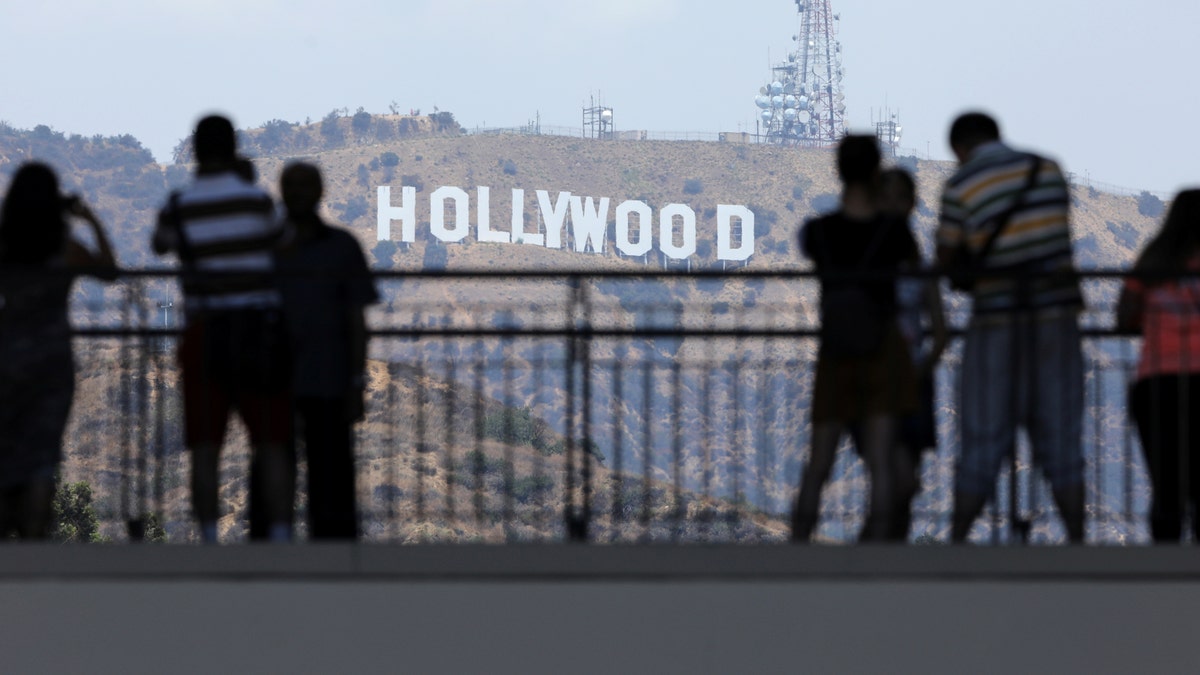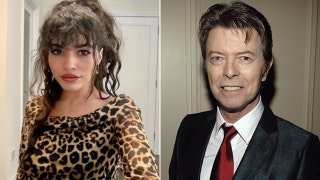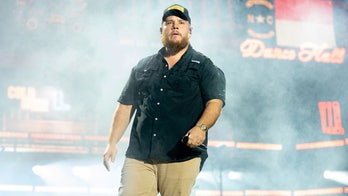
FILE -- Tourists take pictures of the Hollywood sign from a shopping complex along Hollywood Boulevard in Hollywood, California, August 3, 2017. (REUTERS/Mike Blake)
Hollywood writers are worried. Though many support the #MeToo movement, some privately wonder if it won’t end up hurting their craft. They wonder if the changing times will make it tougher to be creative.
This particular fear may not be unwarranted. It goes back to 2006, when the California Supreme Court ruling of “Lyle v. Warner Brothers” came about.
JENNIFER LOPEZ SHARES HER #METOO STORY: 'NAH, WE'RE NOT HAVING IT'
The case was initiated by a writers’ assistant on the sitcom "Friends." She had been warned the show was about six young people in New York with healthy libidos, and that she would be hearing a lot of discussion about sex. Still, after she was fired (for allegedly not doing her job well), she sued some of the writers on the show, as well as others higher up the command chain, for sexual harassment.
Her complaint went into fairly specific detail about what she witnessed. She claimed it wasn’t all directly about jokes that might go into the script. For instance, she said, the writers would sometimes discuss their own sexual fantasies as well as the sexual histories of the actors on the show.
BARBRA STREISAND HAS NO '#METOO' STORY, JOKINGLY SAYS HER NOSE KEPT PREDATORS AWAY
The court, ruling on summary judgment, didn’t question the assistant’s claims. The unanimous decision, written by Justice Marvin Baxter, accepted that she’d heard sexually coarse and vulgar language. However, the ruling said, the language wasn’t directed at her, but was part of the freewheeling atmosphere in a room where people write comedy, and thus was not harassment.
Justice Ming Chin added in his concurrent opinion that even though the court did not need to raise First Amendment issues in this case, he believed any other result would have violated the defendants’ free speech rights.
“Presumably someone might be offended [and] ultimately it doesn’t make its way into the show, but it doesn’t matter — that speech which is part of the writing process has to be protected."
Eugene Volokh, a UCLA law professor and noted First Amendment scholar who consulted on the case, explained to Fox News that Chin’s constitutional argument wouldn’t apply to every business. He said it would apply “for what people have labeled communicative workplaces, like universities, newspapers, television writers’ rooms and the like, where the purpose of the workplace is to produce speech, and the process of producing the speech will involve conversations that people might find offensive.”
Volokh noted problematical speech could arise behind the scenes on many sorts of programs — a show like “Homeland” could have writers discussing what anti-Muslim statements a character might make; on “Game Of Thrones,” there could be a discussion of how a character could be tortured or raped; and certainly, on a comedy that features a lot of sexual activity, the writers will naturally talk about sex.
“Presumably someone might be offended [and] ultimately it doesn’t make its way into the show, but it doesn’t matter — that speech which is part of the writing process has to be protected,” Volokh said.
WEINSTEIN COMPANY FILES FOR CHAPTER 11 WITH BUYOUT OFFER IN HAND
When the “Lyle” case was decided 7-0 for the defendants, Hollywood heaved a sigh of relief. Many saw this is a crucial test of freedom for writers — amicus briefs were filed on behalf of the defendants by, among others, the Writers Guild, the Association of American Publishers, Inc. and the American Society of Newspaper Editors.
Which brings us to today. There’s a different climate in Hollywood (and elsewhere). With so many stories of abuse coming out, people are much more sensitive to potential problems. The Writers Guild itself is now emphasizing a zero-tolerance approach to sexual harassment.
So some writers are asking (in secret, for the most part): Can they still be as free as they want while creating?
If there’s a new attitude, will they have to look over their shoulder, or censor themselves, before they make a rash remark? And if they do worry about what they say, will this stifle their creativity?
The creative process is mysterious, and comedy writers are never sure where their next joke is coming from.
In this new atmosphere, the courts could reinterpret the law in a stricter manner. As Profesor Volokh notes, “If there is legal liability, it stops being a matter of just informal accommodation, and becomes a matter of legal command. That’s a lot harder to negotiate around.”
Plenty feel it’s about time the #MeToo movement came to the fore, and took down people who were taking advantage of others. But there are also a number of writers who fear, if things go too far, that their creativity may suffer from collateral damage.













































